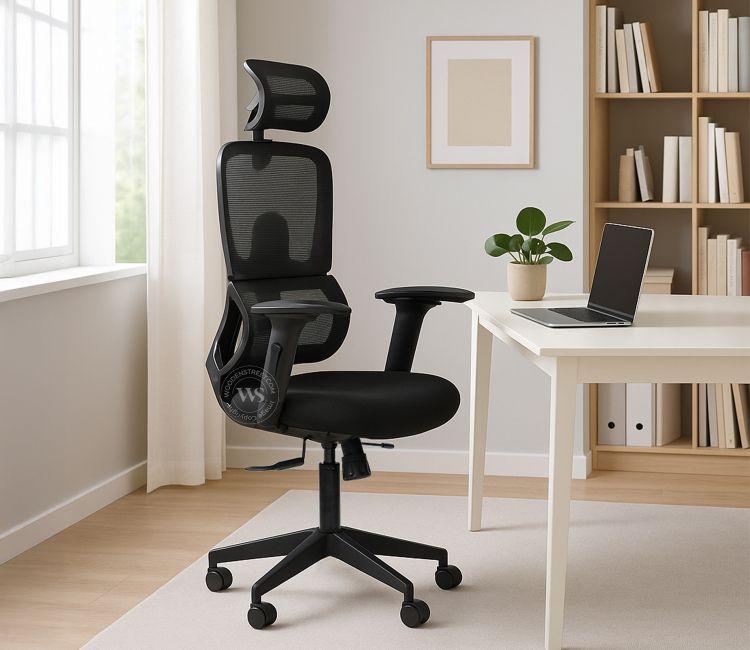Factors to Consider Before Buying a Chair for Office Use

Choosing the right office chair is one of the most important decisions for creating a comfortable and productive work environment. Whether you work from home or in a corporate setting, the chair you use has a direct impact on your health, focus, and efficiency. Since most professionals spend hours sitting, a poor-quality chair can lead to back pain, fatigue, and long-term health issues. Therefore, investing time in understanding the key factors before making a purchase is essential.
Importance of Ergonomics
The first factor to consider when selecting an office chair is ergonomics. An ergonomically designed chair is built to support the natural curve of the spine, ensuring that posture is maintained throughout the day. It should provide lumbar support, adjustable features, and sufficient cushioning. Ergonomics not only helps prevent discomfort but also reduces the risk of musculoskeletal problems, which are common among people who sit for extended periods. By choosing an ergonomic chair, professionals can improve comfort and productivity simultaneously.
Adjustability Features
No two people have the same body structure or seating preference, which is why adjustability plays a significant role. A quality office chair should allow users to adjust the height, backrest angle, armrests, and seat depth. Adjustable features ensure that the chair can be customized to suit individual needs, preventing strain on the neck, shoulders, and lower back. For example, a chair with height adjustment ensures that feet are placed flat on the floor while working, which is vital for maintaining balance and circulation.
Material and Cushioning
The material of a chair determines both comfort and durability. Breathable mesh materials are often preferred because they allow airflow, preventing heat buildup during long sitting hours. On the other hand, leather or fabric-covered chairs provide a more classic appearance but may require more maintenance. Cushioning should strike the right balance between softness and firmness. A seat that is too soft may cause sinking and discomfort, while one that is too firm can create pressure points. The material and padding directly influence how comfortable the office chair feels over time.
Support for Posture
Another factor to evaluate is how well the chair supports posture. A good chair should encourage the user to sit upright without slouching. Proper lumbar support, a well-shaped backrest, and a slight recline mechanism are all features that help maintain posture. Sitting with poor alignment can lead to long-term back issues, neck strain, and reduced concentration. A supportive chair reduces fatigue and keeps the body aligned naturally, which is especially important for professionals who spend the majority of their day working at a desk.
Mobility and Swivel Function
An office environment requires movement, whether it is reaching for files, turning toward a colleague, or shifting across the desk. A chair with a swivel base and smooth-rolling casters allows effortless mobility without strain. Chairs with rigid designs often make users stretch uncomfortably, which can lead to muscle tension. A swivel function ensures flexibility and helps maintain workflow efficiency, while strong wheels allow smooth movement on different flooring types.
Size and Space Compatibility
Before purchasing a chair, it is also necessary to consider the size of both the chair and the office space. A chair that is too large may crowd a small room, while a compact chair may not provide enough support for the user. The seat width and depth should accommodate the person comfortably without restricting movement. Measuring available space beforehand ensures that the chair fits seamlessly into the working area without creating clutter or discomfort.
Aesthetic and Design
While functionality is the top priority, design should not be overlooked. The look of the chair should complement the style of the office or home workspace. A well-designed office chair enhances the overall aesthetic and creates a professional atmosphere. Chairs are available in various styles, from modern mesh-backed designs to executive leather finishes. Selecting one that matches the décor adds to the visual appeal of the workplace and can positively influence mood and motivation.
Durability and Build Quality
Since an office chair is a long-term investment, build quality is a critical factor. Sturdy frames, high-quality wheels, and durable materials ensure that the chair can withstand daily use for years without wearing out quickly. A poorly built chair might seem affordable initially, but frequent replacements or repairs make it costly in the long run. Investing in a durable chair provides value for money and guarantees consistent support over time.
Health and Productivity Benefits
A well-chosen office chair does more than provide comfort. It directly influences health and productivity. Sitting for long hours without proper support often results in fatigue, lack of focus, and physical strain. A supportive chair reduces these risks, helping professionals stay energized and focused throughout the day. Improved posture also contributes to better breathing and circulation, enhancing overall wellness. Ultimately, the right chair plays an essential role in creating a healthy and efficient working environment.
Final Thoughts
Buying a chair for office use requires careful consideration of various factors, ranging from ergonomics to durability. Since the chair directly affects posture, comfort, and efficiency, it is not just a piece of furniture but an essential tool for productivity. Paying attention to features such as adjustability, support, materials, and mobility ensures that the chosen office chair not only suits personal needs but also enhances overall well-being. By making an informed decision, professionals can create a workspace that promotes both comfort and long-term health.
- Art
- Causes
- Crafts
- Dance
- Drinks
- Film
- Fitness
- Food
- Games
- Gardening
- Health
- Home
- Literature
- Music
- Networking
- Other
- Party
- Religion
- Shopping
- Sports
- Theater
- Wellness


